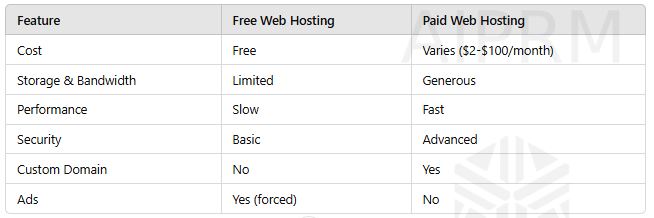If you’ve ever thought about starting a website, you’ve probably come across the term web hosting service. But what exactly does it mean? And why is it essential for your online presence? In this article, we’ll break down everything you need to know about web hosting, how it works, and why it’s crucial for anyone who wants to build a website.
What Is a Web Hosting Service?
In simple terms, a web hosting service is a platform that allows individuals and businesses to make their websites accessible on the Internet. It is like renting space on a server where all your website’s files, images, and data are stored.
Without web hosting, your website wouldn’t be accessible to users worldwide. When someone types your website’s domain name into their browser, the hosting server retrieves the stored data and displays your site.
How Does Web Hosting Work?
Web hosting works through servers, storage, and internet connectivity. Here’s a simplified breakdown:
- You Purchase a Hosting Plan – You choose a web hosting provider and buy a hosting plan that fits your needs.
- Your Website’s Data is Stored on a Server – The hosting provider stores all your website files on a powerful server.
- Users Access Your Website – When visitors type your domain name, the server delivers your website to their browser.
- 24/7 Availability – Hosting services ensure your site stays online 24/7 with minimal downtime.
Types of Web Hosting Services
There are several types of web hosting services, each catering to different needs. Let’s go over the most common ones:
1. Shared Hosting
- Best for beginners and small websites.
- Multiple websites share the same server.
- Affordable but limited resources.
2. VPS (Virtual Private Server) Hosting
- Offers more control and dedicated resources.
- Good for growing websites with moderate traffic.
- A balance between shared hosting and dedicated hosting.
3. Dedicated Hosting
- A full server dedicated to your website.
- Ideal for large businesses and high-traffic websites.
- It is more expensive but provides maximum performance.
4. Cloud Hosting
- Uses multiple servers to ensure reliability.
- Scalable resources based on demand.
- Great for websites with fluctuating traffic.
5. Managed WordPress Hosting
- Optimized for WordPress websites.
- Automatic updates, security, and performance tuning.
- Best for bloggers and businesses using WordPress.
Why Do You Need Web Hosting?
Now that we’ve covered what web hosting is, let’s discuss why you need it:
1. Website Accessibility
Without web hosting, your website would not exist on the Internet. Hosting services allow users to visit your site anytime, from anywhere.
2. Performance and Speed
A reliable hosting provider ensures your site loads quickly, which is crucial for user experience and SEO rankings.
3. Security and Data Protection
Good hosting services offer security features such as firewalls, SSL certificates, and regular backups to keep your data safe.
4. Custom Email Addresses
Most hosting plans allow you to create professional email addresses using your domain name (e.g., yourname@yourwebsite.com).
5. Scalability and Growth
As your website grows, you can upgrade your hosting plan to accommodate more traffic and better performance.
How to Choose the Right Web Hosting Service
Selecting the right web hosting service depends on several factors. Here’s what you should consider:
1. Price and Budget
If you’re looking for affordability, cheap web hosting options like shared hosting are ideal. However, if you need better performance, you should invest in a higher-tier plan.
2. Uptime and Reliability
Look for hosting providers that offer at least 99.9% uptime to ensure your website remains accessible at all times.
3. Customer Support
A good hosting provider offers 24/7 customer support to help you with any technical issues.
4. Storage and Bandwidth
Check if the hosting plan provides enough storage and bandwidth for your website’s needs.
5. Security Features
Ensure the hosting provider includes security measures like SSL certificates, firewalls, and malware protection.
Free vs. Paid Web Hosting Services
You might be wondering whether you should go for free web hosting services or invest in a paid hosting plan. Let’s compare:

While free hosting might seem attractive, it comes with many limitations, including ads, slow speeds, and no custom domain options. If you’re serious about your website, a paid hosting service is the better choice.
Popular Web Hosting Providers
If you’re ready to choose a web hosting service provider, here are some of the best options:
1. Bluehost
Bluehost is one of the most popular web hosting companies, offering a wide variety of hosting plans including shared hosting, VPS hosting, and dedicated servers. Known for its reliability and speed, Bluehost is recommended by WordPress.org and provides a user-friendly interface with excellent customer support, free domain for the first year, and a 30-day money-back guarantee. It’s ideal for both beginners and growing businesses.
2. Ironhosts
Ironhosts is a web hosting provider focused on delivering high-performance hosting solutions, including cloud hosting, VPS hosting, and dedicated servers. With an emphasis on security and uptime, Ironhosts offers fast, scalable hosting options for businesses and developers. They provide top-notch customer service, robust infrastructure, and enterprise-level features for demanding websites and applications.
3. SiteGround
SiteGround is known for its exceptional customer service and high-performance hosting. With shared hosting, cloud hosting, and dedicated servers, SiteGround provides excellent security, fast load times, and automatic updates. It’s popular among WordPress users, offering a seamless integration with WordPress and reliable customer support available 24/7. Their hosting is optimized for speed, with data centers located around the world.
4. HostGator
HostGator is a versatile hosting provider offering shared hosting, VPS, dedicated servers, and WordPress hosting. Known for its affordable pricing and robust features, HostGator provides 24/7 customer support, a 45-day money-back guarantee, and a free website builder. HostGator is ideal for small businesses, bloggers, and users looking for reliable and scalable hosting solutions at competitive rates.
5. A2 Hosting
A2 Hosting stands out for its high-speed performance and developer-friendly hosting solutions. They offer shared hosting, VPS hosting, dedicated servers, and managed WordPress hosting, all optimized for speed with their Turbo Servers. A2 Hosting is known for its excellent customer support, free website migration, and eco-friendly hosting solutions, making it a great choice for websites needing performance and scalability.
6. Cloudways
Cloudways is a managed cloud hosting platform that lets users choose from a variety of cloud providers like Amazon Web Services (AWS), Google Cloud, and DigitalOcean. It’s designed for users who need advanced cloud hosting features without the complexity. Cloudways offers scalability, high uptime, and enhanced security features, making it a great choice for businesses with high traffic needs or complex hosting requirements.
How to Get Started with a Web Hosting Service
Setting up your website with a hosting provider is easy. Follow these steps:
- Choose a hosting provider – Compare features and pricing.
- Register a domain name – Some hosts offer free domain registration.
- Select a hosting plan – Pick a plan that suits your needs.
- Set up your website – Install a CMS like WordPress or upload your site files.
- Launch your site – Make it live and start attracting visitors!
Conclusion
A web hosting service is essential for anyone looking to create a website. Whether you’re running a blog, an online store, or a business website, the right hosting provider ensures your site stays online, loads quickly, and remains secure. If you’re just starting, choose a plan that fits your needs and budget, and as your website grows, you can upgrade accordingly.
FAQs
1. What is a web hosting service, and how does it work?
A web hosting service stores your website’s data on a server and makes it accessible online. When users type your domain name, the server delivers your site to their browser.
2. Can I get free web hosting services?
Yes, but free hosting has many limitations, such as ads, slow performance, and limited storage. A paid hosting plan is usually a better choice.
3. What’s the difference between shared and dedicated hosting?
Shared hosting means multiple websites use the same server, while dedicated hosting gives you an entire server for your website, providing better performance and security.
4. Is cheap web hosting good for beginners?
Yes! Cheap hosting plans are perfect for beginners, but as your site grows, you may need to upgrade for better performance.
5. Do I need a domain name to use web hosting?
Yes, a domain name is necessary for users to find your website online. Many hosting providers offer free domain registration with their plans.

